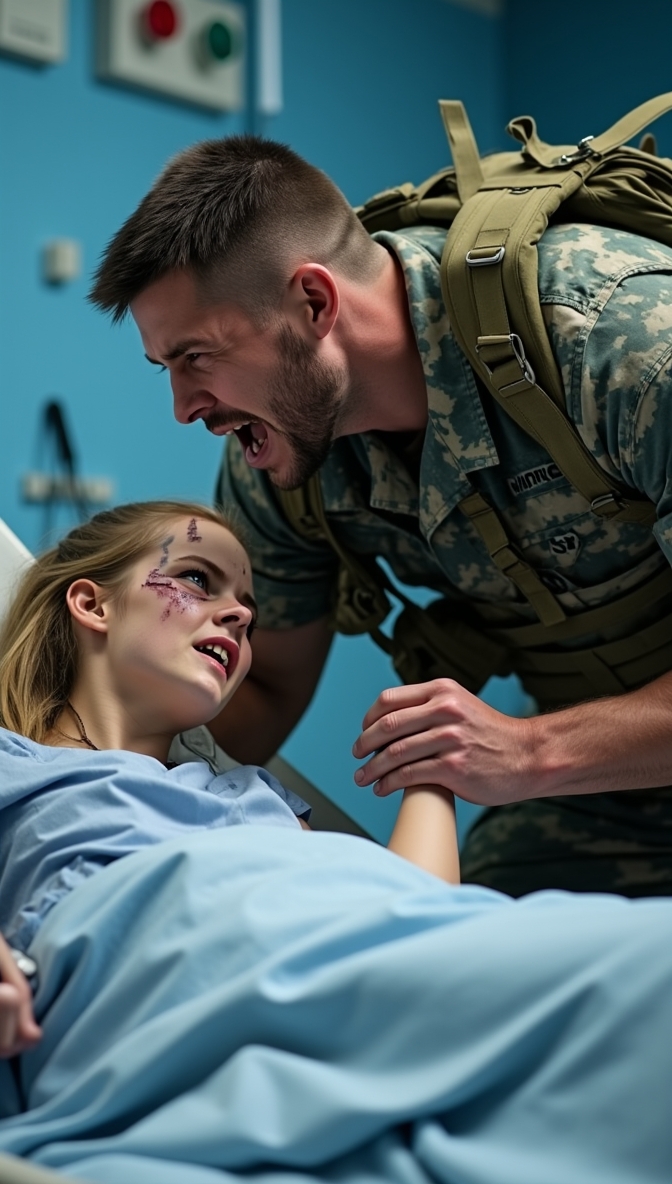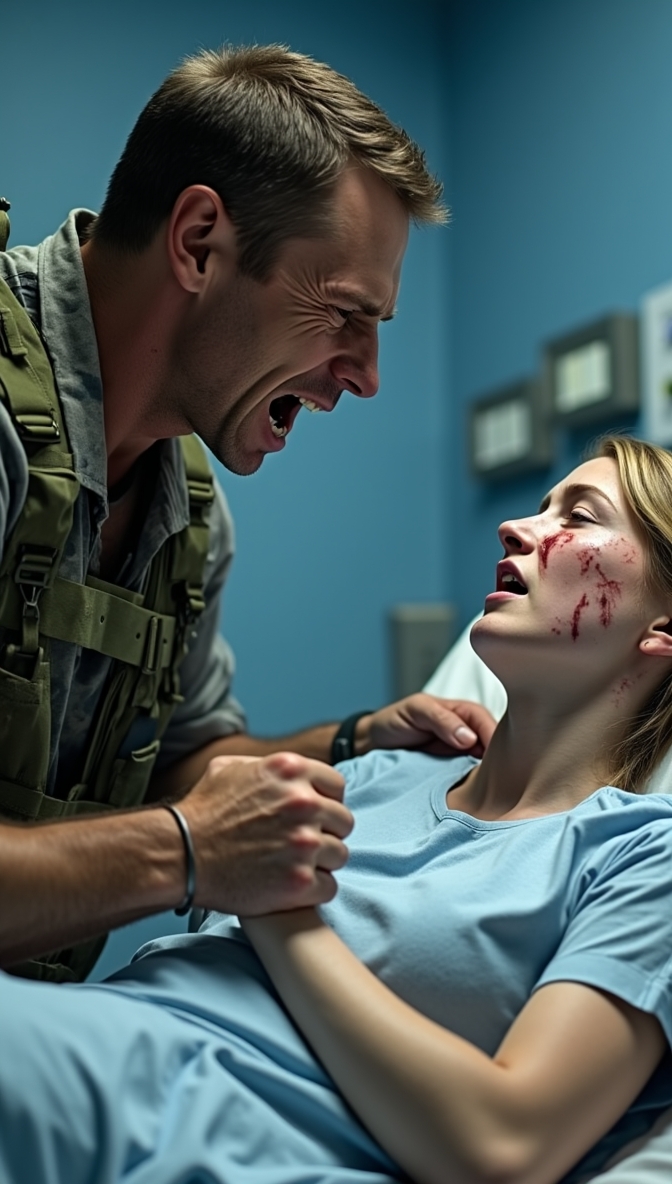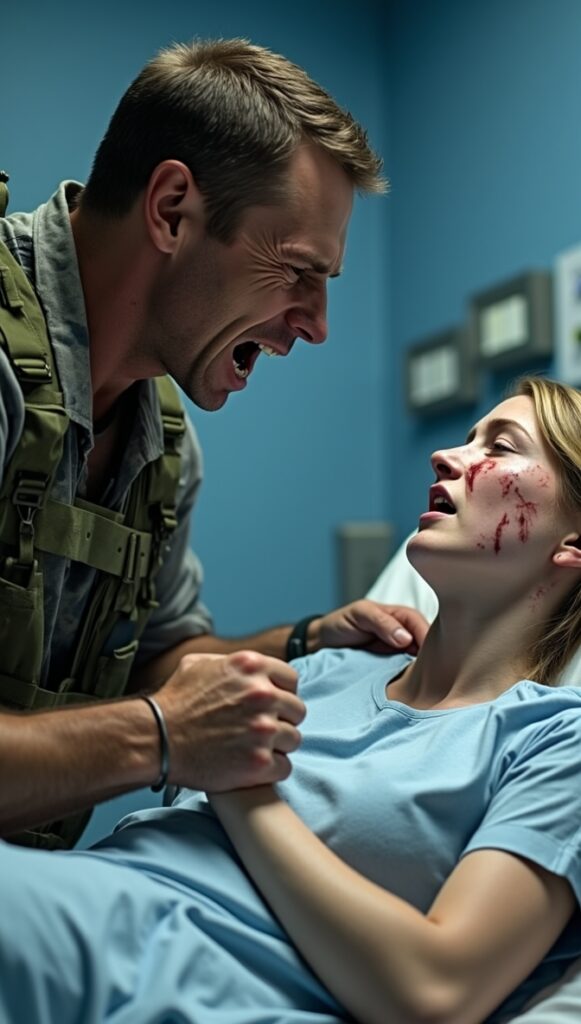The Sheriff Said My Sister Was Gone — But What I Found Back Home Revealed a Truth Even He Couldn’t Face…
The desert has a way of teaching you patience.
Out there, under the blistering Afghan sun, everything slows down — even time. You learn to count breaths instead of hours. You stop waiting for peace and start listening for danger hiding behind silence.
That’s where Sergeant Daniel Mercer was when the satellite phone rang.
He was in the outpost’s comm tent, surrounded by dust, sweat, and the faint hum of generators. It was late afternoon, and for once, no one was shooting.
He picked up the receiver. “Mercer here.”
A voice on the other end trembled, low but steady.
“Dan… it’s Sheriff Alden.”
Daniel straightened. Alden had been like a second father growing up — a man of few words but solid as granite. He’d taught Daniel how to hunt, how to drive, how to stay calm when things went bad.
“Sheriff? What’s going on?”
There was a long silence. Then Alden said the words Daniel would never forget.
“Your sister’s gone, son. Rachel’s dead.”
The noise around him stopped. Even the desert wind seemed to fade.
Daniel’s knuckles went white around the phone. “What do you mean gone?”
“She was attacked,” Alden said. “We found her this morning. In her house. Brad’s responsible.”
Brad. Her husband. A man Daniel had never trusted — the kind who smiled too wide and apologized too quickly.
Daniel’s breath hitched. “You arrested him?”
The sheriff hesitated. “He’s… out. His father’s people pulled strings before we could finish booking him. It’s complicated, Dan.”
“Complicated?” Daniel’s voice cracked. “He killed her!”
Alden’s sigh came through the static. “I’ve seen a lot of things in this town. Power runs deep, deeper than truth sometimes. I’m sorry, son. I wish I could fix it.”
Daniel’s heartbeat thudded in his ears. “Don’t apologize. Just tell me where he is.”
“You don’t want to do this,” Alden warned. “Let it go. Trust the system.”
“The system?” Daniel said, his voice shaking. “The same system that just let my sister’s killer walk out a free man?”
Silence. Then, quietly, Alden said:
“Sometimes the only way to find justice… is to get your hands dirty.”
The line went dead.
Daniel stood there for a long time, staring at the dust blowing across the tent floor. His commanding officer came in a few minutes later, saw the look on his face, and didn’t even ask questions.
“Take your leave, Sergeant. We’ll handle things here.”

The Texas heat hit him like a wall when he stepped off the plane. The air smelled like rain and dirt and memory.
Rachel’s funeral had already passed. He missed it by two days.
He drove straight from the airport to her house — a small, white farmhouse on the edge of town. The front porch light still flickered. Her garden, once full of sunflowers, was wilted and dry.
Inside, the living room looked staged — as if someone had cleaned too much, too quickly. But there were small things that hadn’t been erased: her favorite book left open on the armchair, a coffee mug on the counter, a child’s drawing pinned to the fridge.
Daniel stared at it — a crayon picture of Rachel holding her son’s hand. Above it, in shaky letters, the boy had written: “Mommy and me.”
His throat closed.
Then he heard a creak behind him.
“Uncle Dan?”
It was Eli, Rachel’s eight-year-old boy, standing in the hallway clutching a stuffed bear. His eyes were wide and too old for his age.
“Hey, kiddo,” Daniel whispered, kneeling. “You okay?”
Eli shook his head. “Mom’s gone. Grandpa says she’s with the angels.”
Daniel swallowed hard. “Yeah, buddy. She is.”
The boy hesitated. “Dad said it was an accident. But… Mommy didn’t look like it was an accident.”
Daniel froze. “What do you mean?”
Eli’s eyes filled with tears. “There was blood on the stairs. He told me to go to my room and not come out.”
Daniel pulled him close. His hands trembled. “You did the right thing, Eli.”
That night, Daniel slept in Rachel’s house — if you could call it sleep. Every creak sounded like footsteps, every gust of wind like her voice calling out.
And just before dawn, he found something that changed everything.
The Journal
It was hidden behind the dresser in Rachel’s room — a small, leather-bound notebook. Inside were pages of her handwriting, tight and rushed.
Each entry was a crack in the facade she’d been living under. Notes about bruises she couldn’t explain. Excuses she had to make for her husband. Fear written between every line.
The last entry was dated the day before she died:
“If anything happens to me, it wasn’t an accident. He said if I try to leave, he’ll make sure I regret it. I’m scared for Eli. If Dan ever reads this, please protect my boy.”
Daniel stared at the words until they blurred. His chest tightened with something deeper than grief.
He drove to Alden’s office at dawn. The sheriff was packing boxes, his badge already on the desk.
“You knew,” Daniel said quietly, holding the notebook up. “Didn’t you?”
Alden’s shoulders sagged. “I didn’t have proof, son. Just suspicions. By the time I got there, it was too late.”
“Too late to arrest him?”
“Too late to keep him alive if you keep going down this road.”
Daniel stepped closer. “You said justice meant getting your hands dirty. Did you mean that, or were you just trying to wash your own?”
Alden didn’t answer. He looked tired, older than Daniel remembered.
Finally, he said, “You go after Brad Perry, you’d better be ready to live with what comes after.”
Daniel nodded. “I already do.”
The Truth Beneath the Surface
Daniel started digging. Literally.
He returned to Rachel’s house and tore up the old flowerbed beside the porch. The soil was loose, turned over recently. Six inches down, he found a small metal tin. Inside — a flash drive and a folded letter.
The drive contained video files: secretly recorded clips from Rachel’s phone. Brad yelling. Throwing things. One clip showed him holding her by the arm, voice slurred:
“You think anyone’s gonna believe you over me?”
The letter inside the tin was worse. It was addressed to Alden.
“Sheriff,
You said you’d protect me. You said if I brought proof, you’d make it stop. I did everything you asked. But now he knows. I think he’s going to kill me. Please—don’t let him get away with it.”
Daniel’s hands shook. Alden hadn’t just known. He’d promised her protection — and failed.

That night, Daniel drove to the Perry estate. The gate was open. Brad was sitting on the porch with a drink in his hand, calm as ever.
“You shouldn’t be here,” Brad said without looking up.
Daniel stepped forward. “You killed my sister.”
Brad smiled faintly. “She was unstable. Everyone knew it. She fell.”
“Funny,” Daniel said, pulling a small recorder from his pocket, “she recorded you saying you’d do it.”
The smile faltered.
Daniel tossed the flash drive onto the table. “I sent copies to the news and the DA. By tomorrow morning, your family name’s gonna be worth less than the dirt under your boots.”
Brad’s face turned red. “You think this is over?”
Daniel leaned closer. “It’s over when she rests.”
Brad lunged for him. Daniel moved faster. Years of combat training took over. Within seconds, Brad was pinned against the wall, gasping.
Daniel could’ve ended it right there. Every cell in his body screamed to. But Rachel’s voice — gentle, tired — echoed in his mind. “Protect my boy.”
So he stepped back. “You’ll rot for what you did,” he said quietly.
And then he left.
One Week Later
The files went public. News vans swarmed the Perry estate. The sheriff’s department reopened the case under state supervision. Brad was arrested on charges of second-degree murder, evidence tampering, and obstruction.
Alden retired quietly the same day. He never answered Daniel’s calls.
Eli moved in with Daniel, who left the Army for good. They sold Rachel’s house, moved two towns over, started over.
Some nights, Eli still woke up crying. Other nights, Daniel did.
One evening, while tucking the boy in, Eli asked, “Uncle Dan, is the bad man gone now?”
Daniel paused. “He’s gone, buddy.”
Eli frowned. “Then why do you still look sad?”
Daniel forced a smile. “Because sometimes… even when the bad guys lose, the good people don’t win either.”
Six Months Later
A letter arrived in the mail with no return address. Inside was Alden’s old badge and a note in his handwriting:
“I should’ve done more. You did what I couldn’t. Don’t let it consume you like it did me.”
Daniel stared at the badge for a long time, then set it on the mantel beside Rachel’s photo.
That night, as he stood outside watching the Texas sky bleed orange and gold, Eli came up beside him.
“Mom would’ve liked the sunset,” the boy said.
“Yeah,” Daniel murmured. “She would’ve.”
He glanced down at the sheriff’s badge, then back at the horizon.
Justice had come. The truth was out. But peace? That was something no court or confession could give back.
And as the wind whispered through the grass, Daniel asked himself the question that had haunted him since the day the phone rang in Afghanistan:
When the system fails and you take justice into your own hands — do you still deserve to call yourself the good guy?


